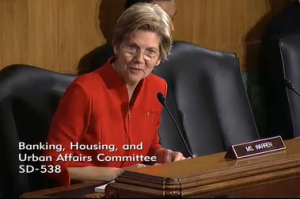Sen. Warren: Why Can Banks Commit Crimes But Get Away Without Admitting Guilt? Image courtesy of On Feb. 14, Sen. Elizabeth Warren grilled bank regulators on their failure to take banks to trial.
In a letter [PDF] sent yesterday to Federal Reserve Chair Ben Bernanke, Attorney General Eric Holder, and SEC Chair Mary Jo White, Sen. Warren recalls a question she asked the OCC following the Feb. 14 Senate Banking Committee hearing.
“Has the OCC conducted any internal research or analysis on trade-offs to the public between settling an enforcement action without admission of guilt and going forward with litigation as necessary to obtain such an admission?” she asked the Comptroller of the Currency after the hearing. “If so, can you provide that analysis to the Committee?”
The response was probably not what she was hoping to hear back from the agency.
“The OCC does not have any internal research or analysis on the trade-off of settling without and admission of liability,” the Comptroller’s office replied to Warren’s query.
In her letter, Warren explains that she understands why there is a tendency toward settlements, but expresses her concern of the long-term ramifications of repeatedly allowing banks to settle without going to trial or admitting culpability.
“There is no question that settlements, fines, consent order, and cease and desist orders are important enforcement tools, and that trials are expensive, demand numerous resources, and are often less preferable than settlements,” writes the Senator. “But I believe strongly that if a regulator reveals itself to be unwilling to take large financial institutions all the way to trial — either because it is too timid or because it lacks resources — the regulator has a lot less leverage in settlement negotiations and will be forced to settle on terms that are much more favorable to the wrongdoer.”
And it’s not just a matter of mounting some banker’s head on the wall like a trophy. Warren believes there are negative consequences. Those wronged by the defendant banks might receive insufficient compensation. And settlements without admissions of guilt might provide inadequate deterrence to banks considering pushing the boundaries of the law in the future.
“If large financial institutions can break the law and accumulate millions in profits and, if they get caught, settle by paying out those profits, they do not have much incentive to follow the law,” writes Warren.
In closing, she puts the same question — has there been any research done about the impacts of settlements without guilty pleas? — to the Fed, the DOJ and the SEC.
“I am interested in learning more about how your institution has evaluated the cost to the public of settling cases without requiring an admission of guilt rather than pursuing more aggressive actions,” she writes.
Want more consumer news? Visit our parent organization, Consumer Reports, for the latest on scams, recalls, and other consumer issues.


